Advertisement
Published: September 14th 2006
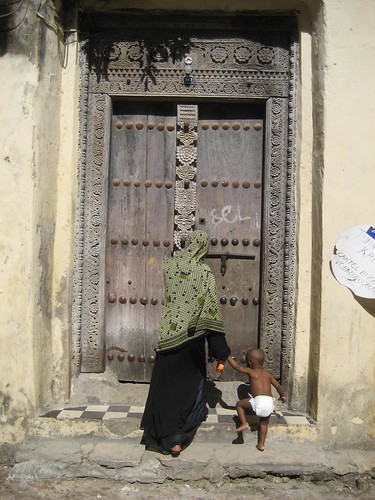
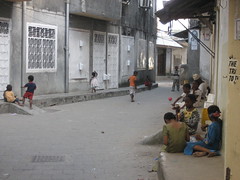
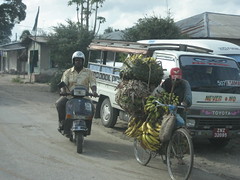
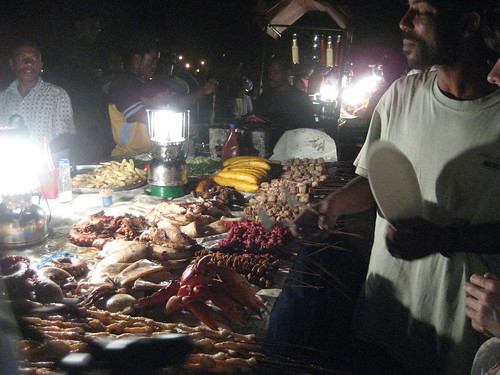
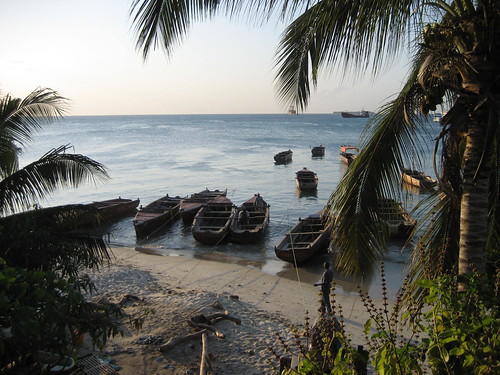
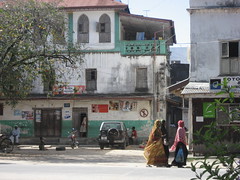
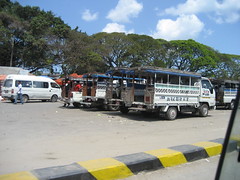
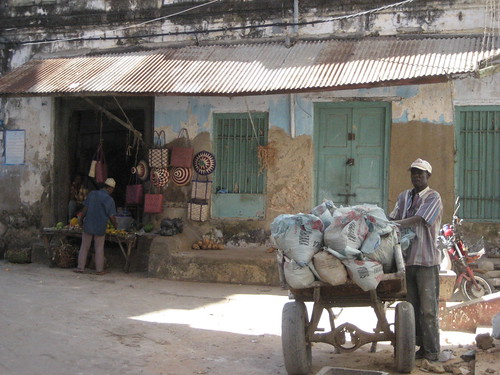
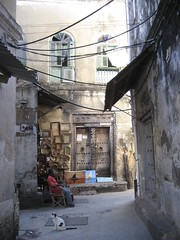
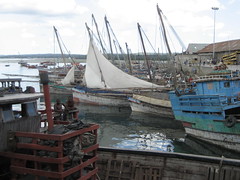
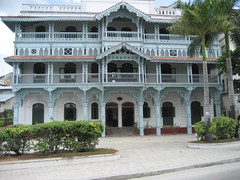
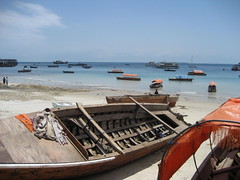
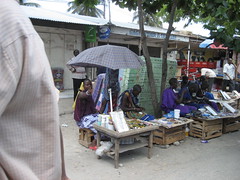
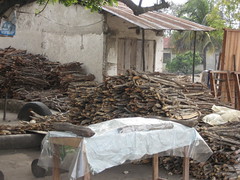
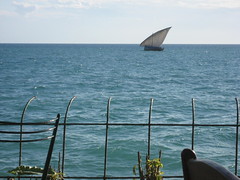
The start in Zanzibar was a little shaky as the taxi driver tried to charge me twice what we agreed to for the ride from the airport. Once we got that settled, I went out to see some of the sights. First impressions are that it’s cleaner than Kenya and, while the climate is similar to Mombassa’s, it’s much more relaxed here. As the island’s only city, Stonetown is where most things happen. There are a few scattered beach resorts on other sides of the island.
Just to give you an idea of the town’s pace, there is only one ATM that accepts Visa and half the time it doesn’t work. On my first day I met a Dutch tour guide standing in line at this same machine and she suggested I come along to “sundowners” at the Africa House. That’s what they call watching the sunset. This place had an upstairs veranda from which to do it from and judging by the large crowd gathered, it seemed the place to be. She joined her tour there and, luckily, one of the group had a camera similar to mine and was willing to charge my batteries. That was great news because around every corner is a photo opportunity.
Zanzibar became famous for its trading—mainly in gold, ivory, spices and slaves. The Arabs and Persians had trade routes up and down the coast but this was the main trading center. You can still visit the old slave market—a sad reminder of that era. Many of the buildings are colonial and are covered in mold as they were in Mombasa.
It’s very easy to get lost in the labyrinth of narrow streets throughout the city. It’s not a bad thing to get lost in Zanzibar because each turn offers some exotic sight to see. Kids play everywhere and always greet you enthusiastically and old people rest outside on stoops. You could make a career out of the study of the intricately carved doors of Zanzibar--there's a book filled with photos of them. Some are old and weathered and others are newer, restored or painted.
I’ve met some interesting and very nice people here—in fact the whole trip has been filled with good, like minded people—from many countries. This has been one of the delightful surprises of my travels. At the Africa House I spent the evening talking with a Canadian man who worked for the Carter Foundation (as in Jimmy Carter) overseeing elections in countries where free elections are initiated. His most recent assignments have been in Palestine and now in the Congo where the election narrowed the field to two. In October the second election will be held to determine the winner and he was on a short break in between. He’s been working in third world countries for the last fifteen years—first with a Canadian peace keeping organization and then with the UN.
On a spice tour there was a Polish couple who I again saw over coffee the next day. We met later for sundowners and they invited me to join them at the night market. People warn you about going out at night if you’re a woman alone, so I was pleased to join them as people had raved about this nightly event. All of the town's food vendors set up along the seaport and they cook up everything from seafood to Zanzibar pizzas. The raw food is all spread out on tables ready to be cooked over hot coals. Everyone comes out—locals and tourists alike. Someone is making fresh squeezed juice from sugar cane with a contraption that looks like an old wringer washing machine. Fries (aka chips) are boiling in hot oil over coals. You can get everything from octopus to bananas cooked on the fire. It’s smoky, exotic and festive and everyone is having a good time and the food is wonderful.
Since the beaches around the town aren’t that clean, I arranged for a van to pick me up at the hotel. These vans fill up with passengers and then drive to the other side of the island and drop you off wherever you choose. I had little idea of where to stay but wanted a change so I planned to "wing it". Everyone in the van had pretty much the same idea so when we got to the “Red Monkey” in Jambiani, a place in a tiny village on the eastern side of the island, four of us decided to get out.
We "four" consisted of two 24 year Irish guys (medical students) who had just completed a six week hospital experience in Uganda. The other was a woman, also Irish. We were the only ones staying there who were not “a couple” and for the next three days we did everything together.
It’s an interesting thing to spend all your time with people you’ve never met before and the closeness and comfort you can feel in just a short time. Even though you will probably never see them again, for those few days you become close. We went out on the boat together, share all our meals, walked the beaches, had massages and mostly lounged around.
Their names are Liam, Declan (guys) and Bronagh (girl). How’s that for Irish! Bronagh and Declan just happened to be from Newry in Northern Ireland and had never met before. We had some good fun with my ipod. I brought it out one night only to surprise Declan with all the Irish songs on it. That was thanks to Barb Thomson, Marshall & Jean for letting me download all their music before I left.
Overall, the guys knew nothing of the songs from my era and I knew nothing of their music, even though some of it was on the ipod. Bronagh at age 33 knew all kinds of music on both sides. Her idea one afternoon was to put the earphones on someone else and select a song for them to sing—like karaoke. We all took turns and were horribly out of tune, causing those listening to double over in laughter. A Swedish guy got in on the act with a mean version of “Stayin Alive”. He had a pretty good falsetto. We were in tears.
One day we hired a crew to take us out on a dhow—a primitive sailing vessel common on the Indian Ocean. Each time we needed to change directions, the sail was untied and then hoisted on the other side. It was simple but it worked. The sail was made of sewn-together plastic rice bags. The hull was narrow and deep and we sat on the rim of the boat—the crew making sure that the weight was balanced. The low and high tides come twice a day here—not sure if that is unique to being close to the equator. At low tide the water is shallow for quite a ways out so we had to walk far to reach the boat. We snorkeled in coral reefs which were not very colorful but had interesting soft corals and sponges and blue star fishes. There were tons of sea urchins—which two of the group managed to step on. We did our best to keep from being burned with umbrellas but everyone except me came back with a sunburn—Bronagh with the worst. The crew was fun and Declan suggested that one of them give me a kiss just as he was taking my photo. The guy went for it and you can see the look on my face.
After three days of doing nothing but relaxing, snorkeling and eating, we were all ready to get back to life on the road. You can relax yourself into paralysis. The guys were off for a 30 hour train to Zambia and later Cape Town and Bronagh was going home. We arrived in town in time for them to catch the afternoon ferry to Dar es Salaam, which I will be catching in a couple of days. I stayed in Stonetown to make onward plans and do erands. My flight from Dar isn’t until Sept. 20th and I may do a short Safari from there if I can fit it in.
Searching for people with the same camera so I can recharge the batteries, has become an ongoing quest. Last night I spied some German tourists and worked up the nerve to ask them for the favor. They were great and most willing to oblige. Strangers have been so nice in this regard. It takes a degree of faith because they have the batteries overnight and hopefully remember to leave them for me in the lobby. So far, it’s worked.
Advertisement
Tot: 0.224s; Tpl: 0.015s; cc: 10; qc: 49; dbt: 0.0759s; 1; m:domysql w:travelblog (10.17.0.13); sld: 1;
; mem: 1.2mb














